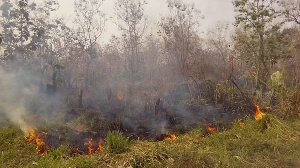Cut off from easy access to the massive Afram Lake, an island community in the Eastern region is a battleground for nomadic herdsmen and local farmers.
The conflict has been a difficult challenge as the community is as arduous a destination. One spends six hours by road and at least one more mile by a pontoon. Only the interested would want to peep into this conflict over green grass in the Maame Krobo community.
Farms and families have been destroyed. But the appeasing price for peace is yet to be paid.
The Afram Plains is a food basket of this Ghana and a dirty food basket too. Farmers here live in abject poverty and the squalor is obvious. Only two things are important here and only two things trigger mayhem here - the cattle of the nomadic herdsmen and the vegetation of the indigenes. If a cattle dies mysteriously, retribution looms for the farmers – the first suspects. If a vegetation is destroyed, nomadic herdsmen are a target of great anger.
Cupping his chin in his hand, 70-year-old Baapire Dery Matthew’s life hurdle and daily headache is how to feed 20 children and three wives from his 5-acre cassava and yam farm.
The farm has been grazed down by nomadic herdsmen for the second time. He is a hungry man and an angry man.
The Baapire family’s second source for food is 20-year-old Kwaku James, a hunter. But one near-death encounter with the herdsmen snuffed out all James' desire to continue hunting for game.
One strange night in the Adegya Forest Reserve, a herd rushed in his direction after he had locked his focused gun on a deer.
Kwaku scurried away into some bushes nearby, fearful that the gun-wielding cattle guards had seen him as their flashlights danced around in the darkness. The cattle grazed as he endured an awful hiding place where imagining a deadly reptile around was not unrealistic. After spending the entire night in the bush, it was game-over for his hunting game.
In Atonsu, many of the farmers have very familiar stories of death and destruction. When Kwaku Guda’s yam farm was destroyed by rampaging cattle, he really believed his life had come to an end. And so when an indigene of Agyibe town was allegedly beheaded by some herdsmen, there were enough wells of anger to trigger retaliation. Three nomadic herdsmen were also killed.
Now Chief and President of the Kwahu Traditional Area Nana Asiedu Agyemang wants the nomads out of his area.
“One Fulani herdsman can control about a 1,000 cattle and so immediately they get into your farm, I tell you within one hour, everything will go”, the chief’s sense of helplessness seeped through his voice.
At least 50 soldiers were dispatched to the area and to the chief’s palace to calm tensions and drive out the herdsmen who have been given a one-month ultimatum to leave.
The herdsmen started settling in southern Ghana including the Afram Plains in the 1990s, according to Sociologist at the University of Ghana, Prof Stephen Tonah.
According to Prof Tonah, deforestation in the Afram Plains proved inviting for the herdsmen and with the passage of time, nomadic herdsmen from neighbouring Niger, Benin and Nigeria also made a foraging journey into the area.
They have lived there, married there, raised children there, they are now citizens here.
“By our constitution, they are Ghanaians, so if you call for their expulsion, where do you want them to go?” he said.
Article 4 of the treaty establishing the Africa Economic Community allows for the gradual removal, among Member States, of obstacles to the free movement of persons, goods, services and capital and the right of residence and establishment;
The nomadic herdsmen would find solace in the treaty's support of their migration to Ghana to with their animals.
But Article 3 of the revised African Convention on the conservation of nature and natural resources frowns on the destroying of reserved areas by the grazing herd.
Hama Hamadu is a 23-year-old of Fulani origin born and raised in Ghana. But in reality, like other people of Fulani origin, he feels and is rated a second class citizen by the indigenes. He remembers being falsely accused and locked behind bars.
“They say I stole a cattle. I also know I am not the one who stole the cattle. So after they bailed me, I led them to the one who stole the cattle”, he said.
Amadu has also been living in Ghana for more than 50 years and takes care of 500 cattle. In his black jacket over his green gown, Amadu prepares his cattle to graze.
He has seen more hate-inspired violence against people of Fulani origin. Their animals have been killed and injured without justification. He narrated how he was brutalised during a recent operation carried out by a joint military and police taskforce at Papaso in Afram Plains.
He concedes that people of Fulanis are not saints. But one thing he can boldly defend them about is that they pay for the cost of damage to crops when it’s brought to their attention.
Last year, the Fulani community in the Afram Plains witnessed the peak of violent attacks from local farmers. He feels unsafe though his been living here all his life. He recounts their losses in that attack to me.
Hama Hamadu explained that their vocation as herdsmen of cattle means they mostly lead nomadic lives, following their cattle to look for greener pastures, especially, during the long dry season. Many people confuse that search for an attempt to destroy people’s farms.
The protocol of the Economic Community of West African States promotes free movement of people and goods within the 16-nation community for a maximum of 90 days without a visa.
The central government has been criticized for their handling of the crisis. A High Court judgment had ordered the removal of the herdsmen but for nearly 12 years, the government has failed to carry this out.
The nomadic herdsmen’s activities have been left largely unregulated and left to the chiefs to use their own traditional devices of influence, albeit weak, to grapple with the guns and marauding cattle.
Farmlands are not the only source of livelihood destroyed. The pond which serves as the community’s source of drinking water has been muddied and polluted by the cattle and has also dried up.
Walking long distances in search of drinking water have become a daily reality for many indigenes at Asankesu.
When the nomads were approaching this village, the community built a barricade of tree stumps and leaves around this pond, but, that wall was not enough to hold back the marauding herds from accessing the pond.
Food from farmers destroyed, water from ponds muddied, life gets worse for the townfolks while the nomadic herdsmen say their way of life is largely misunderstood.
So how should the nation resolve the crisis between the nomadic herdsmen and the locals? Security expert Dr Festus Obeng thinks reconciliation of the various actors is the way to go.
“…the relationship between the nomadic herdsmen and the farmers has denigrated and they need to be restored”, Dr. Obeng.
Regional News of Friday, 27 May 2016
Source: Kwetey Nartey
Feature: Afram plains, a bread basket, a grazing paradise, a battleground
Entertainment












